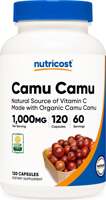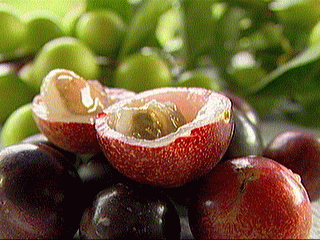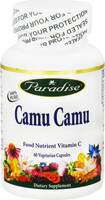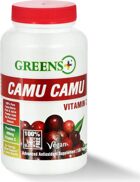Camu camu (Myrciaria dubia) is a type of shrub common throughout the Amazon rainforest. It is well known for its high vitamin C content, as well as beta-carotene, fatty acids, and protein.[1] Camu camu berries are edible and have a very sour taste. Therefore, it's preferable to consume it as a supplement in capsule or powder form.
Benefits
Traditionally, camu camu has been used to treat the following:
Viral infections (herpes, shingles)
Eye conditions (cataracts, glaucoma)
Asthma
Atherosclerosis (hardening of the arteries)
Chronic fatigue syndrome
Gingivitis
Headaches
Osteoarthritis
There is, however, no conclusive evidence indicating its effectiveness.
That isn't to say there aren't any benefits to the vegetation. Camu camu has very high vitamin C content -- about 2% to 3% of its fresh weight.[2] Some preliminary studies have indicated that camu camu may be useful for treating inflammation and oxidative stress, as well as diabetes.[5] Research also suggests that camu camu may be high in anthocyanins, a flavonoid with antioxidant effects.
Antioxidant effects
Researchers at Japan's Saga University studied 20 male smokers, giving one group 70ml of 100% camu camu juice daily, and the control group 1050mg of vitamin C. The camu camu group had a significant decrease in oxidative stress markers, reactive oxygen species, and inflammatory markers. The study concluded that there may be some unknown antioxidant substances besides vitamin C in camu camu.[2]
Anti-Inflammatory effects
A study at the Tokyo University of Marine Science and Technology showed that oral supplementation of camu camu extract in mice reduced the formation of edema (the collection of fluid in tissues). In a test tube, camu camu suppressed the release of nitric oxide from cells.[6] The source of these anti-inflammatory properties was found to be betulinic acid, a compound with anti-inflammatory, antiretroviral, and antimalarial properties. According to the American Cancer Society, it "may hold promise as an anticancer agent."[7] The study concluded that camu camu seed extract can potentially be used to prevent immune-related diseases.
Obesity
Camu camu has shown potential for aiding in obesity reduction in some studies conducted with rats. Rats with diet-induced obesity were put in two groups: an experimental group ingested camu camu pulp, the control group did not. After 12 weeks, their tissues were collected. The rats that consumed pulp saw a reduction of fat in white adipose tissues, glucose, total cholesterol, triglycerides, LDL "bad" cholesterol, and insulin blood levels.[3] However, it's very important to note that no such studies have been performed on humans and this is not a miracle weight loss cure.
Negative side effects
There isn't enough research to indicate dangers of consuming camu camu. However, some studies suggest it may interact with drugs used in chemotherapy treatments.[5] Consuming abnormally high amounts of camu camu may result in side effects associated with vitamin C megadosage, such as diarrhea.
Conclusion
Although camu camu shows potential for many health benefits, research is limited and not many claims regarding it have been proven. In addition, because it only grows in specific areas, it's very expensive compared to other sources of vitamin C. The only thing we know for sure is that it's not harmful, and including it in your diet isn't a bad idea if you want to try it out.
References
- WebMD.com; "CAMU CAMU: Uses, Side Effects, Interactions and Warnings;" Retrieved August 2013
- Inoue, T., et. al.; Journal of Cardiology; "Tropical Fruit Camu-camu (Myrciaria Dubia) Has Anti-oxidative and Anti-inflammatory Properties;" October 2008
- Nascimento, OV, et. al.; Annals of the Brazilian Academy of Sciences; "Effects of Diet Supplementation with Camu-camu (Myrciaria Dubia HBK McVaugh) Fruit in a Rat Model of Diet-induced Obesity;" March 2013.
- Takayama, Percy; Living In Peru; "Peruvian Camu Camu Fruit Conquers Japan;" February 2007
- Wong, Cathy; About.com; "Camu Camu - What Should I Know About It?" Updated August 2013
- Yazawa, K., et. al.; Journal of Nutritional Science and Vitaminology; "Anti-inflammatory Effects of Seeds of the Tropical Fruit Camu-camu (Myrciaria Dubia);" 2011
- American Cancer Society; "White Birch;" Reviewed 2008
Camu Camu News on PricePlow
-
Jan 11, 2024 
Product News
Nutricost Camu Camu was created.
Category: Camu Camu -
Jun 19, 2023 
Product News
Swanson Camu Camu Berries was created.
Categories: Antioxidants, Camu Camu
Sign up for future Camu Camu news!
Click the button below to sign up for future Camu Camu news, deals, coupons, and reviews!



